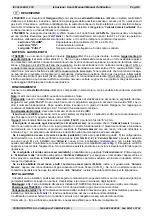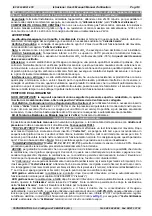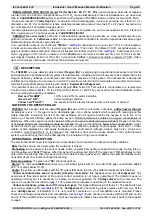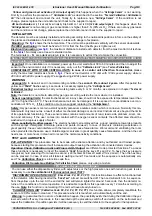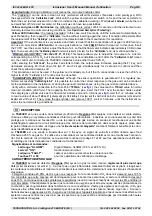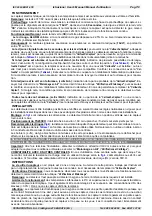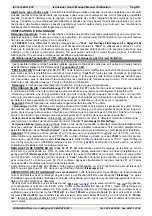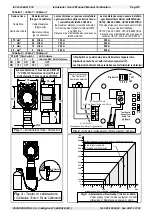
IST-2293.EO01.01/C
Istruzione / User’s Manual / Manuel d’utilisation
Pag.6/9
TECNOCONTROL S.r.l. Via Miglioli 47 SEGRATE ( MI )
Tel: 02/26 92 28 90 Fax: 02/21 33 734
Important note:
During Calibration in Air routine the mA output indicates 0mA
.
The “
Calibration
”
can be done in clean air only (
environment without the presence of flammable or other polluting gas
). With
the keys perform the “
Calibration
Code
". Wait until the yellow and green Led switch on fix and the red Led starts to
flash (the Led red
remains switch on fixed to indicate the calibration working). Wait (
obout 3 minutes
) while the red
Led switched off (
for more of 2 seconds
). At this point we can have two possibilities:
Yellow and green LED illuminates:
the calibration routine is correct.
Wait 8 seconds, until the instrument auto-
matically restores the normal working conditions
.
(
see “
Operational Description > Preheating
”
).
Yellow LED illuminates:
the routine has failed. In this case, wait 8 seconds, until the instrument automatically re-
peat Preheating, then repeat the “
Calibration
”
routine without inserting again the code. If condition still persists after
the replacement of the “
Cartridge
”, please send the detector back to the manufacturer for reparation.
Important
: If the environment is very polluted and there is doubt that the concentration of oxygen is 20.9%vol you
can use an air cylinder (
20.9%vol O
2
) or use a gas balloon (
our code
PA020
) filled with clean air. In this case, insert
the TC011 over the sensor holder, adjust the flow of air, so that the flow meter indicates approximately 0.3l/min (
see
fig.3
), then executing the "
Calibrating Code
" and wait (
about 3 minutes
) for the "
Calibration
" end, as mentioned above.
"
FINE mA ADJ OUTPUT”
(
ADJ Code: F2, F1, F1, F2
): This feature allows you to adjust the mA output of ± 0.32 mA
corresponding to ± 0.5% O
2
, but it should be used only at new installation and if, after the "
Calibration in Air
" (clean
air), the control unit, connected to TS293EO, indicates a value other than 20.9% O
2
.
After entering the "
ADJ
Code
", the yellow Led starts to flash, the output value increases pressing the F1 key, and
decreases pressing F2. Hold down the two F1 and F2 keys simultaneously for 2 seconds to confirm and then
check that yellow Led remains off.
This procedure can not be used, if the yellow Led is already on, but if the O
2
concentration is less than 20.6% or
higher to 21.2% "
Calibration in Air
" routine must be done first.
“CALIBRATION CHECKS” (
no Code required
):
although the sensor operation is guaranteed if it is regularly per-
formed successfully "
Calibrating in Air
", it is possible to control the correct response to the gas and can be made af-
ter the calibration or the installation, or during the periodic maintenances, using the gas mixture indicated above.
Verify with a voltmeter connected to the Test-Point “
TESTmA
” (
see fig. 2
), the value reach a
174mV
value in normal
clean air condition (20.9%v/v). Then opplying the 16%v/v O
2
gas, insert the TC011 over the sensor holder; adjust
the sample gas cylinder
valve as the flow meter indicates around 0.3 l/mins (
see fig.3
), wait for 1÷2 minutes, verify
to read a value of about
143 mV
. [
corresponding to
14.3
mA
(±0.2) output and the Central Unit which is connected to the detector,
displays about 16%(±0.2)
]. Then, close the gas cylinder
and remove TC011, wait 2÷3 minutes, until the instrument re-
stores the normal working conditions.
DESCRIPTION
Le
TS293EO
est une sonde à transmetteur (4÷20mA) de
Oxygène (O
2
)
équipée d’un capteur a cellule électro-
chimique utilisée en systèmes centralisés d'alarme pour laboratoires, industries et environnements qui doit être
protégé par le manque ou l'excès d'O
2
ou de la présence de gaz inertes. La sonde est constituée par une boîtier
antidéflagrant contenant le circuit électronique et les borniers de raccordement; dans le porte capteur, placé dans
la partie inférieure du boîtier, est logée une "
cartouche capteur échangeable
" contenant l'élément sensible et les don-
nées identificatrices et de réglage.
Le
TS293EO
est une sonde a transmetteur sur 3 fils avec un signal de sortie
S
4÷20mA linéaire avec fond
d’échelle à 25,0% du gaz O
2
. Il s’utilise en se raccordant sur les centrales d’alarmes mono et multivoies Tecnocon-
trol. Sur la carte de circuit imprimé, se trouvent les touches de codage F1 et F2 pour les opérations de vérification
et calibrage et 3 leds indiquant les conditions de fonctionnement.
Signalisations et commandes:
Led rouge "ALARM":
Signal d'alarme ALARM (19,5% et 22,5% O
2
)
Led vert "ON":
fonctionnement normal.
Led jaune "FAULT":
capteur en panne ou déconnecté ou saturé ou échu.
Touches F1
et
F2
pour les opérations de vérification et calibrage
CARACTÉRISTIQUES DU GAZ
Le
TS293EO
permet de détecter l’
Oxygène (O
2
)
qui est un gaz incolore, inodore,
légèrement plus lourd que
l’air
(
sa densité relative à l’air est de 1,1
). Ce n’est pas un gaz inflammable mais étant fortement oxydant, il réagit avec
les matériaux combustibles et réducteurs en facilitant leur combustion, déterminant ainsi des risques d’incendie et
d’explosion.
L’Oxygène constitue 20,95% de l’air que nous respirons. Si la concentration d’O
2
dans l’air descend sous 19,5%
l’on considère que cette carence est dommageable pour la santé des personnes, si cette concentration descend
sous 16%, ce manque cause des problèmes respiratoires jusqu’à provoquer l’asphyxie et sous les 6% entraîner la
mort immédiate. Il faut également penser que la carence en oxygène peut être provoquée par des phénomènes de
combustion, par l’augmentation dans l’ambiance de la concentration d’autre gaz agissant par oxyprive (CO
2
, gaz
toxiques et/ou inflammables) mais également par des pertes de gaz inertes (azote, hélium, argon etc.). A concen-
trations élevées, supérieures à 24% l’oxygène est irritant pour l’appareil respiratoire et peut causer des effets sur le
système nerveux central, les yeux ainsi que les poumons qui peuvent être endommagés par l’inhalation de hautes
concentrations d’oxygène.


